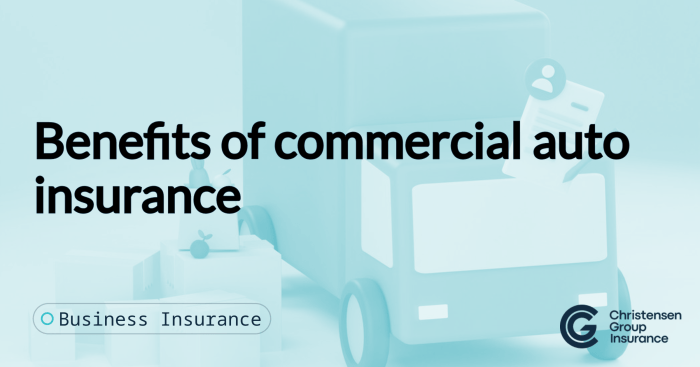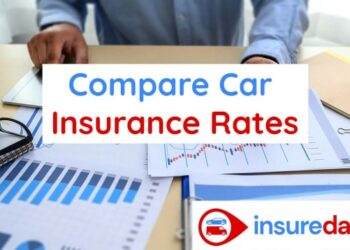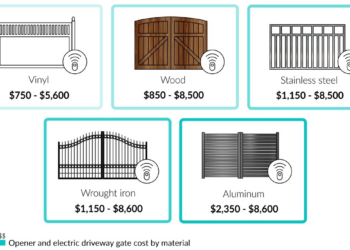Key Benefits of Having a Commercial Auto Policy for Your Company sets the stage for this enthralling narrative, offering readers a glimpse into a story that is rich in detail with casual formal language style and brimming with originality from the outset.
The content of the second paragraph that provides descriptive and clear information about the topic
Importance of Commercial Auto Policy
Having a commercial auto policy is crucial for any company that relies on vehicles for its operations. This insurance provides coverage and protection in case of accidents, damages, or injuries involving company vehicles.
Risks of Not Having a Commercial Auto Policy
Without a commercial auto policy, companies are exposed to significant financial risks. Any accidents or damages involving company vehicles could lead to expensive liabilities and legal issues that may threaten the financial stability of the business.
Comparison with Personal Auto Insurance
- Commercial auto policies typically offer higher liability limits compared to personal auto insurance. This is essential for companies that may face larger claims in case of accidents.
- Commercial auto policies also cover employees driving company vehicles for work purposes, which may not be included in personal auto insurance.
- Personal auto insurance may not provide coverage for vehicles used for commercial activities, leaving a gap in protection for companies.
Coverage Details
When it comes to a commercial auto policy, there are several types of coverage that are typically included to protect your company and its vehicles. Understanding these coverage options is crucial to ensure that your business is adequately protected in various situations.
Liability Coverage
Liability coverage is essential in a commercial auto policy as it provides protection in case your company is at fault in an accident that results in bodily injury or property damage to others. This coverage helps cover the costs of medical bills, property repairs, and legal fees.
Physical Damage Coverage
Physical damage coverage includes both collision and comprehensive coverage. Collision coverage helps pay for repairs or replacement of your vehicle if it is damaged in an accident, while comprehensive coverage helps cover damages from non-collision incidents such as theft, vandalism, or natural disasters.
Uninsured/Underinsured Motorist Coverage
This coverage protects your company if your vehicle is involved in an accident with a driver who doesn't have insurance or enough insurance to cover the damages. Uninsured/underinsured motorist coverage helps pay for medical bills and vehicle repairs in such situations.
Medical Payments Coverage
Medical payments coverage helps pay for medical expenses for you and your passengers if injured in an accident, regardless of who is at fault. This coverage can help cover hospital bills, surgery costs, and other medical expenses.
Rental Reimbursement Coverage
Rental reimbursement coverage provides compensation for the cost of renting a vehicle while your company's vehicle is being repaired due to a covered loss. This coverage ensures that your business operations can continue smoothly even when a vehicle is out of commission.
Towing and Labor Coverage
Towing and labor coverage helps cover the costs of towing your vehicle to a repair shop and labor costs for services provided at the breakdown site. This coverage can be beneficial in situations where your vehicle breaks down and needs immediate assistance.
Optional Coverage
In addition to the standard coverages mentioned above, companies may consider adding optional coverages such as roadside assistance, gap insurance, and hired auto coverage to further enhance their commercial auto policy based on their specific needs and operations.
Cost Considerations
When it comes to a commercial auto policy for your company, understanding the cost factors is crucial to make informed decisions. The cost of a commercial auto policy is determined based on various factors that can impact the overall premiums.
Factors Affecting Cost
- The type of vehicles being insured: Different vehicles have varying levels of risk associated with them, affecting the cost of insurance.
- Driving history of employees: The driving records of employees who will be operating the company vehicles can influence premiums.
- Annual mileage: The distance the vehicles are expected to cover in a year can impact the cost of the policy.
- Location of operation: The area where the vehicles will be used can also affect the insurance premiums.
Comparison with Potential Expenses
- Without insurance, the company would be responsible for covering all expenses related to accidents, damages, or liabilities out of pocket. This can result in significant financial strain and potentially threaten the business's operations.
- On the other hand, the cost of a commercial auto policy may seem like an additional expense, but it provides financial protection and peace of mind in case of unforeseen events.
- When comparing the cost of insurance premiums with the potential expenses from accidents or damages, having a commercial auto policy proves to be a cost-effective and prudent investment for the company.
Compliance and Legal Requirements

In the realm of commercial auto insurance, compliance with legal requirements is crucial to ensure the smooth operation of a company's vehicles. Not meeting these regulations can lead to severe consequences that may impact the financial stability and reputation of the business.
Legal Requirements for Commercial Auto Insurance
Commercial auto insurance requirements vary depending on the region and type of business operations. However, most jurisdictions mandate that companies carrying out commercial activities must have a minimum level of insurance coverage for their vehicles. This typically includes liability coverage to protect against damages or injuries caused to others in an accident involving the company's vehicles.
How a Commercial Auto Policy Helps with Compliance
- Ensures Adequate Coverage: A commercial auto policy helps a company meet the legal requirements by providing the necessary coverage levels mandated by law.
- Proof of Insurance: Having a commercial auto policy allows a company to provide proof of insurance, which may be required during inspections or in case of accidents.
- Compliance Verification: Insurance companies often assist in verifying compliance with legal requirements, ensuring that the company's vehicles are properly insured.
Consequences of Non-Compliance
- Financial Penalties: Failing to meet legal insurance requirements for commercial vehicles can result in hefty fines and penalties imposed by regulatory authorities.
- Licensing Issues: Non-compliance may lead to the suspension or revocation of the company's operating licenses, hindering its ability to conduct business.
- Lack of Protection: Without adequate insurance coverage, a company leaves itself vulnerable to lawsuits and financial liabilities in the event of accidents or damages involving its vehicles.
Ultimate Conclusion

The content of the concluding paragraph that provides a summary and last thoughts in an engaging manner
FAQ Resource
What are the consequences of not having a commercial auto policy for your company?
Not having a commercial auto policy can leave your company vulnerable to financial risks in case of accidents involving commercial vehicles. It may lead to legal troubles and financial liabilities that could have been avoided with proper insurance coverage.
What factors can affect the cost of a commercial auto policy?
Factors such as the number of vehicles insured, driving records of employees, types of coverage selected, and the location of your business can influence the cost of a commercial auto policy.
Is commercial auto insurance mandatory for businesses?
In most regions, commercial auto insurance is mandatory for businesses that use vehicles for work purposes. It helps protect your company from potential financial losses and ensures compliance with legal requirements.










